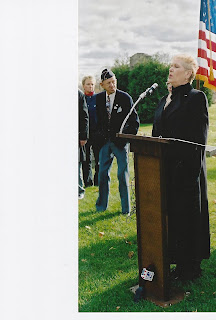Michael Corcoran, 8th US Cavalry, Medal of Honor recipient. Cleveland, Ohio



The family of Michael, Albert, James, Robert, Patti and Donna, we are delighted to have located you and be with you today. The Corcoran surname is found in ancient Irish annals. According to Edward MacLysaght, there are the Mac Corcrain sept (corcair purple), who are of the Ely O'Carroll country in County Offaly and there are the O Corcrain, who were an ecclesiastical family located near Lough Erne, County Fermangh.
Why have we gathered here today at Calvary Cemetery on behalf of one who bore the Corcoran name? Some would call these grounds a resting place for the dead. I look around me and see it is ground for the living.
In 1869, while Andrew Johnson was serving his last year as President, Michael Corcoran, a fellow 'Desert Rat,' served with the U.S. Army in the great Mojave Desert, territory of Arizona. It did not become a state until 1912. The United States at that time was younger, expanding westward to a place where the cultures of the Native American, and other Americans, clashed. Violence and savagery defined the borders
Military service in any desert is not easy duty. Back then it was even harder. Besides the dry heat of the day, the thirst, sudden nosebleeds and the surprising cold of the night, the troopers of the 8th Cavalry were confronted with the ever-present danger of violent death. In one of Corporal Corcoran's letters he wrote, "We had several fights with the Apache Indians this last winter. There is not a day but someone is shot here.....We had three men shot since we got here this spring."
The 8th Cavalry was up against the Apache; the name being a Zuni word meaning "enemy." Their own name for themselves was "Inde", or "the people." By 1869 Apaches were already veterans of fights against the Spanish Conquistadors and the Mexican Army. During Corporal Corcoran's military service the Apache nation was led by a man who has been called "a brilliant personal and charismatic leader, and immensely spiritual." We all know his name - Geronimo.
We don't know exactly what individual actions Corporal Corcoran took on that August day in 1869. We know he displayed courage, valor and unselfishness when he took action against an enemy of the day. Nonetheless, it tells us much about who Michael Corcoran was. In 1916 the government dropped 911 names from the roster of the Medal of Honor. Michael Corcoran's name was not one of them. His discharge papers simply say, "He was a good, sober and faithful soldier." His great-grandson Robert recalls that Michael enjoyed a cup on occasion.
We are here today because of our link to the past. The ancient Celts believed that death in this life meant birth into another life. And, consequently, they believed that birth into this life meant death from the other. While there can be no doubt Corporal Corcoran found himself in a situation that called upon this character and his military training, he didn't flee when danger presented itself. He respected himself and his "Band of Brothers.
General John P. Jumper, former Chief of Staff, United States Air Force, spoke to a graduating NCO Class at Maxwell AFB, Alabama. "The character we seek to define is the fire of conscience that burns within us and superintends our conduct over a lifetime. But character is out of vogue in this world, whose standards are set more by the culture of Beavis and Butthead or the Simpsons, than by the standards of, say, our founding fathers: like John Adams, Thomas Jefferson or James Madison. These men were truly unique. They transitioned easily from the pulpit, to the plowshare, to the musket. They wrote the history of their time with powerful words that will live forever: The Declaration of Independence, the Constitution, the Federalist Papers; and they used words we don't hear today, words that describe the supreme traits of virtue and character that inspired them."
The Irish, it is sometimes said, suffer from too much history. It could be equally stated that Americans suffer from too little. Corporal Corcoran's act of valor on that day so long ago speaks to us of character and individuality.
On Friday, May 31, 1889, twenty years after his actions in the desert, this loving father and husband again saw the need to take immediate action. Perhaps he heeded telegraphed warnings from Elias Unger, President of the South Fork Fishing and Hunting Club. Unger had warned that the old "South Fork Dam," fourteen miles up the Little Connemaugh River, might give away. The dam, 450 feet higher than Johnstown, held the 3-mile long Lake Connemaugh. At 3:15 pm it broke, sending a crescendo of 20 million tons of oily and muddy water rushing down the Connemaugh valley at forty miles per hour. Over 2,000 people died and thousands more were injured in what has become known as "the Johnstown Flood." Again, by his individual action, reputed physical strength and possiobly help from others, Michael Corcoran demonstrated his character by saving his family from injury or death by drowning. He moved them all to higher ground before the floodwaters devoured most of the city.
If we chose to further examine the character of Michael Corcoran we would first see the character of the parents who raised him. We would also see others who were a part of his life; brothers and sisters, aunts, uncles, cousins and friends. And we would see him in his descendents today.
Perhaps the energy created here today by our presence and our prayers, will reach the spirit of both Michael Corcoran and his spouse Johanna Culliton. Perhaps this energy will nourish their spirit... and ours as well.
No comments:
Post a Comment